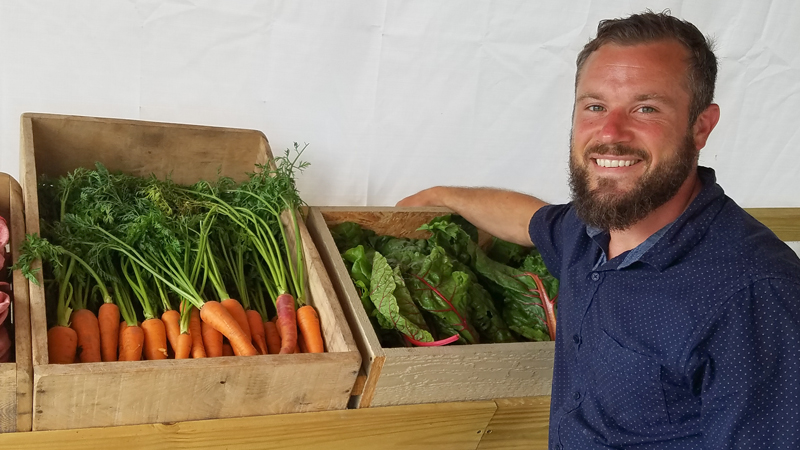North Side garden, farmer’s market grows

By GRAIG GRAZIOSI
ggraziosi@vindy.com
YOUNGSTOWN
The skies darkened over the corner of Bissell Avenue and Bryson Street on Youngstown’s North Side; rain was imminent, and Parker Maynard, Flying High Inc.’s GROW Urban Farm director, had to prepare his crops for a possible deluge.
Defending the garden from heat and rain and an exceptionally large groundhog are a few of the challenges that Maynard teaches his clients – who help run the GROW Urban Farm – to overcome.
The skills needed to tackle challenges at work and the acquisition of new skills are among the inedible fruits borne at the garden, which is primarily staffed by individuals recovering from drug addiction.
Prior to entering into one of Flying High’s job training programs, some clients work at the farm to develop soft skills that will help them maintain jobs once they’ve completed their programs. Along they way, they also learn how to garden.
“There’s this assumption that gardening is a low skill, that it’s an easy thing to just pick up and do. That’s incorrect. It’s not as simple as putting a shovel in someone’s hand. Our clients are learning a real skill while they work with us,” Maynard said.
Last year, GROW Urban Farm began selling the produce harvested from the garden at an on-site farmer’s market. It has continued that practice this year – with produce available from noon to 4 p.m. every Thursday through September – and have expanded as well.
This year, the GROW Urban Farm is the primary vendor for the Alliance for Congregational Transformation In Our Neighborhood’s pop-up market series throughout the city.
On Friday at Federal Plaza, ACTION, the GROW Urban Farm and the Public Library will host another pop-up, where books, produce and prepared food will be available for purchase.
SNAP Cards, produce perks, tokens and senior vouchers, as well as credit cards and cash, are accepted at the markets, which run on various dates between now and October.
Maynard said participating in the markets has been educational for himself and his clients.
“We’re learning about what vegetables are in demand. We’re learning that fruits are in demand. We’re learning what people know about preparing food,” Maynard said.
“We’re learning that food is a very nostalgic thing for people here, that maybe even if they don’t make collard greens or beets themselves, that those foods evoke memories of loved ones who did.”
In response to that feedback, Maynard said GROW Urban Farm was considering acquiring new land for the construction of an orchard.
While the farm is intended to produce food for sale, Maynard emphasized that its primary function was to help Flying High clients in their recovery and eventual reintroduction to the work force.
“I think what the community [agriculture] movement is going to have to embrace is the fact that people who filter into this profession are likely going to be coming from the margins of society,” Maynard said.
“So when we run these farms, it’s not just about production, but also about giving people a place to develop and heal and learn.”
 43
43
